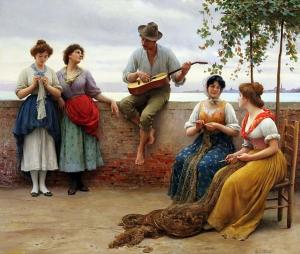Studies on Homer and the Homeric Age: Prolegomena, Achaeis or the Ethnology of the Greek Races, Olympus, Agore, Ilios, Thalassa, Aoidos (Complete)
Nonfiction, Religion & Spirituality, New Age, History, Fiction & Literature| Author: | William Ewart Gladstone | ISBN: | 9781465610287 |
| Publisher: | Library of Alexandria | Publication: | March 8, 2015 |
| Imprint: | Language: | English |
| Author: | William Ewart Gladstone |
| ISBN: | 9781465610287 |
| Publisher: | Library of Alexandria |
| Publication: | March 8, 2015 |
| Imprint: | |
| Language: | English |
We are told that, in an ancient city, he who had a new law to propose made his appearance, when about to discharge that duty, with a halter round his neck. It might be somewhat rigid to re-introduce this practice in the case of those who write new books on subjects, with which the ears at least of the world are familiar. But it is not unreasonable to demand of them some such reason for their boldness as shall be at any rate presumably related to public utility. Complying with this demand by anticipation, I will place in the foreground an explicit statement of the objects which I have in view. These objects are twofold: firstly, to promote and extend the fruitful study of the immortal poems of Homer; and secondly, to vindicate for them, in an age of discussion, their just degree both of absolute and, more especially, of relative critical value. My desire is to indicate at least, if I cannot hope to establish, their proper place, both in the discipline of classical education, and among the materials of historical inquiry. When the world has been hearing and reading Homer, and talking and writing about him, for nearly three thousand years, it may seem strange thus to imply that he is still an ‘inheritor of unfulfilled renown,’ and not yet in full possession of his lawful throne. He who seems to impeach the knowledge and judgment of all former ages, himself runs but an evil chance, and is likely to be found guilty of ignorance and folly. Such, however, is not my design. There is no reason to doubt that Greece
We are told that, in an ancient city, he who had a new law to propose made his appearance, when about to discharge that duty, with a halter round his neck. It might be somewhat rigid to re-introduce this practice in the case of those who write new books on subjects, with which the ears at least of the world are familiar. But it is not unreasonable to demand of them some such reason for their boldness as shall be at any rate presumably related to public utility. Complying with this demand by anticipation, I will place in the foreground an explicit statement of the objects which I have in view. These objects are twofold: firstly, to promote and extend the fruitful study of the immortal poems of Homer; and secondly, to vindicate for them, in an age of discussion, their just degree both of absolute and, more especially, of relative critical value. My desire is to indicate at least, if I cannot hope to establish, their proper place, both in the discipline of classical education, and among the materials of historical inquiry. When the world has been hearing and reading Homer, and talking and writing about him, for nearly three thousand years, it may seem strange thus to imply that he is still an ‘inheritor of unfulfilled renown,’ and not yet in full possession of his lawful throne. He who seems to impeach the knowledge and judgment of all former ages, himself runs but an evil chance, and is likely to be found guilty of ignorance and folly. Such, however, is not my design. There is no reason to doubt that Greece















